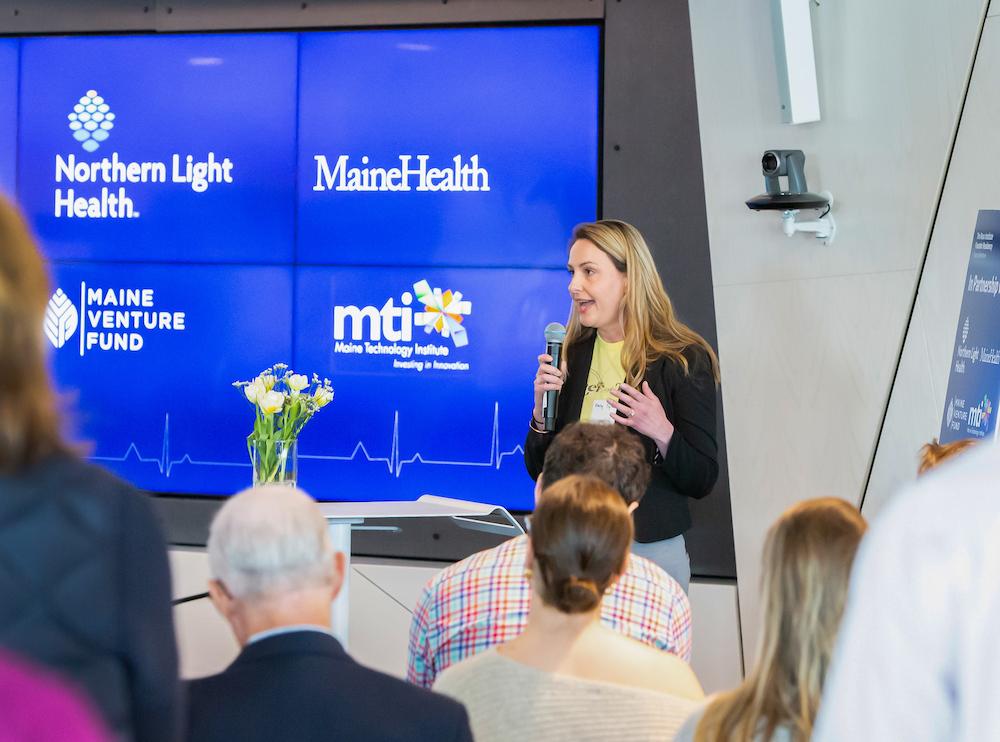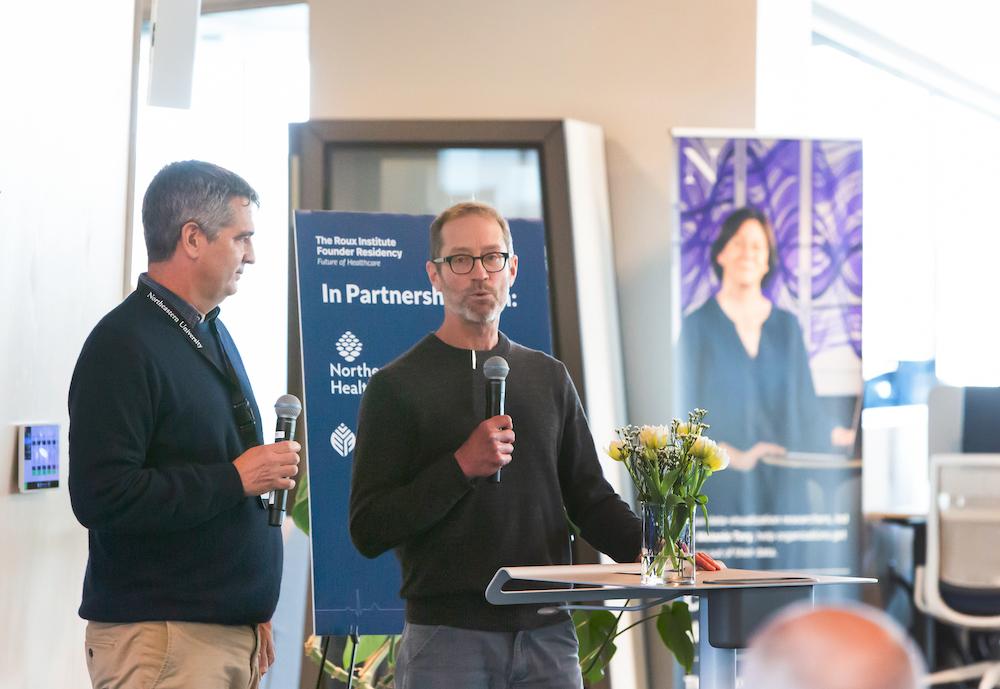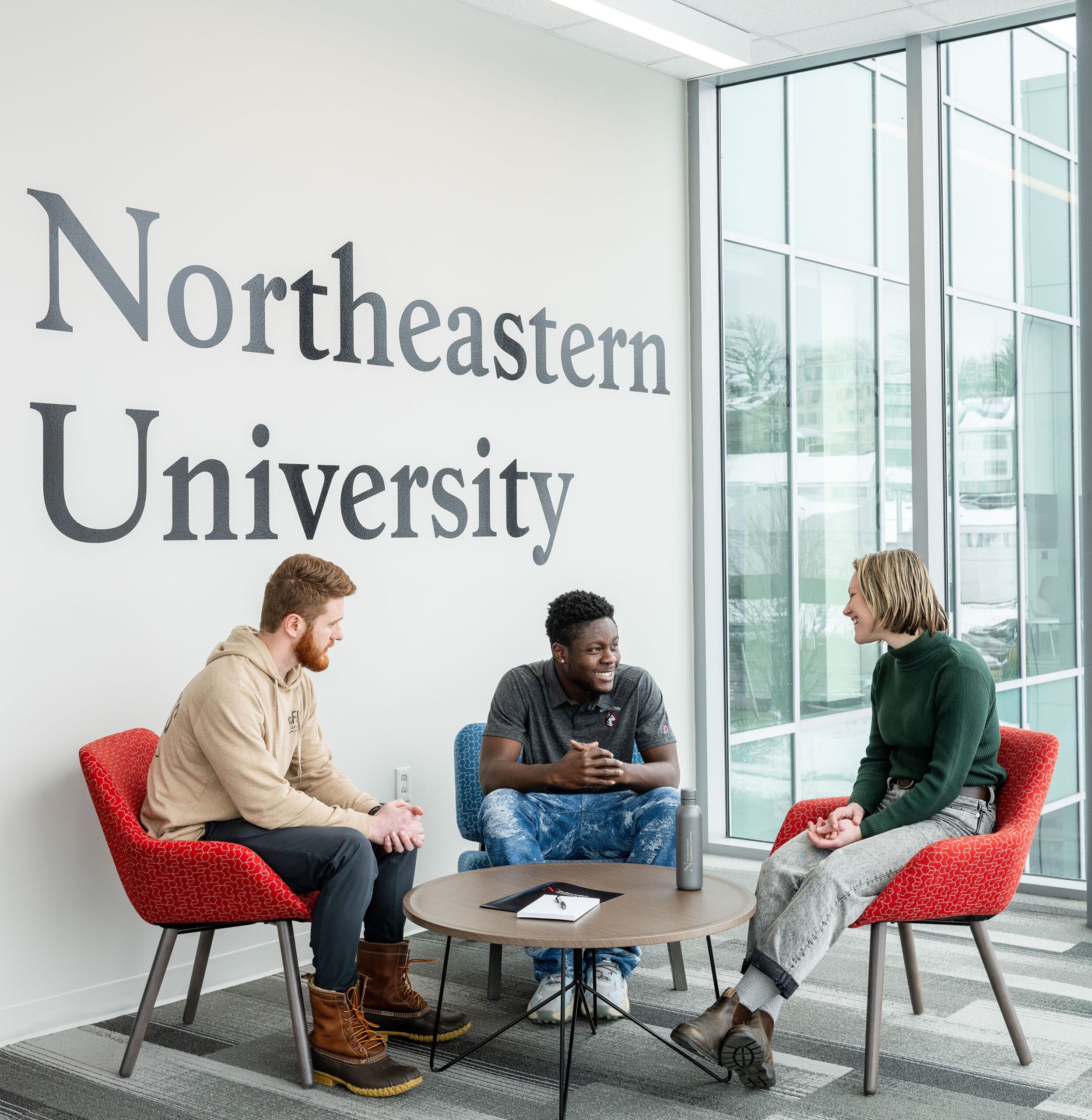
Three months in, founders poised to make a big impact on Maine Healthcare
Nearly three months since its launch, the Roux Institute’s Future of Healthcare Founder Residency is in full swing, with many of the participating companies securing grant funding, building key connections with major players within the healthcare industry, and preparing to pilot cutting-edge products that will transform healthcare in Maine and beyond.
The residency’s inaugural cohort, a group of nine, early-stage health tech startups hailing from three countries and five states, have each received a $50,000 investment and the opportunity to learn from and collaborate with top clinicians and healthcare experts, mentors, and growth-accelerating programming. Designed in partnership with Northern Light Health and MaineHealth, the program is the first of its kind in northern New England. Maine Venture Fund, the state’s venture capital fund, works with companies on-site and is also an investor in the program.
Already, the founders and their teams are seeing major progress, and as they tap into the connections and resources provided by the program, they’re starting to see the shape of the impact their companies could have on healthcare in Maine and throughout the country.
Building Powerful Connections
Of the residency programming so far, founders have voiced that the mentorships and healthcare connections have been the most groundbreaking. Each startup is paired with a dedicated entrepreneur-in-residence and 3-5 mentors who bring extensive relevant experience from careers in healthcare, consulting, engineering, business development, and more. Mentors come from backgrounds at companies including Google, Meta, the FDA, Mass General, and BerryDunn, among others.
Ken Shapiro and Kevin Konty are the founders of Apriqot, a geographic and demographic platform in which health data can integrate, allowing officials and practitioners to observe local conditions and social factors to make more informed health policies. Their target audience is healthcare officials, so the connections they’ve been able to make through Northern Light Health and MaineHealth have been invaluable. “It’s really difficult to penetrate a large healthcare system,” says Shapiro. “At the Roux Institute, we have access to the right people, and we’re having deep conversations with people inside these systems. Without the help of the Roux, that could have taken us a year or more.”
For Shapiro, who discovered the residency almost by accident a week before the application was due, the experience has felt almost serendipitous. He and his co-founder, Konty, both have extensive backgrounds in public health, and both were inspired by the ways local data and surveillance systems were quickly deployed to tremendous outcomes during the COVID-19 pandemic. Shapiro and Konty felt they could do the same thing for the day-to-day practice of population and public health. When Shapiro heard about the residency through a conversation with a neighbor, he sent in an application and hoped for the best. So far, the “best” has come true.
“We came into this residency with a vision of where we would be on the backend of it, and at this moment, the vision in front of us is exactly the vision we had coming into it, as if everything has lined up exactly right. That’s a testament to the structure the [residency] created, to wrap us in support and put us in a position to succeed.”

Roux Support and Programming Accelerates Startup Development “by Years”
Sergio Ribeiro, the founder of Radiolife, a diagnostic tool that uses radio frequency and artificial intelligence to diagnose disease in under 20 seconds, also emphasized the importance of the mentorships and connections within the residency program. He’s working with mentors who have comprehensive backgrounds in compliance, engineering, marketing, and more, including a lieutenant colonel who spent twenty years in the army developing vaccines, studying disease, and working closely with the FDA. “We’d probably be years behind without these mentors. There’s only so much you can do without people with expertise,” says Ribeiro.
Ribeiro and the Radiolife team have also been able to take advantage of the resources embedded inside the Roux Institute – he recently received a Healthcare Solutions Grant, a grant created by the Roux entrepreneurship team that gives participants of the residency the opportunity to work with Northeastern’s Institute for Experiential AI. Riberio says this opportunity will allow him to collect valuable data that will help his go-to-market strategy. Through the residency’s partnership with Northern Light Health, Ribeiro was also able to establish a connection at Quest Diagnostics, a major national clinical laboratory and another opportunity that could propel Radiolife’s development forward by years.
Emily Sylvester, residency participant and the founder and CEO of Mother of Fact, says the residency programming allows her to really put objectives and goals into focus. “The Roux puts everything in one place,” she says, making it easier to see what steps need to be taken and what milestones need to be achieved.
While working as a registered dietitian in a large hospital system, Sylvester felt frustration at what she perceived as a gap in nutrition care for mothers and babies. A lot of the things she saw — gestational diabetes, high blood pressure, preeclampsia, even maternal death — could have been avoided if these mothers had received preventative nutritional care. This troubling pattern inspired her to start Mother of Fact, a digital platform that expectant and new mothers can use to receive virtual nutrition therapy. For hospitals and clinics that don’t have enough dietitians on staff, Sylvester’s platform is an easy way to refer their patients to get the nutrition care they so critically need. Being able to get her product in front of leaders and doctors at MaineHealth and Northern Light Health has been enlightening, to say the least.
“Just the other day I was on a call with a doctor and manager in women’s health at Northern Light. I was able to ask them to be honest and share their opinions on where they saw this going. In talking to them, I was able to move forward with exploring a potential collaboration so much quicker than I would have without that connection,” Sylvester says.
It’s magical and transformational to be here. We’d probably be years behind without these mentors. There’s only so much you can do without people with expertise.
SERGIO RIBEIRO
Founder of Radiolife
Like Shapiro and Konty from Apriqot, Sylvester commented on how difficult it is to penetrate large health systems. With the Roux Institute’s partnerships, participating founders don’t just receive access to these major healthcare systems, they’re receiving investment, mentorship, and expert guidance. With a common goal of improving healthcare in Maine, the institute’s health partners are particularly motivated in helping these founders succeed. “There’s really a commitment, on the part of these healthcare systems, to our success,” says Shapiro.
For Founders, Maine Offers an Ideal Ecosystem for Growth
For the founders, being able to grow their companies in Maine is another benefit of the residency. “Maine has a history of doing things that make sense at a policy level. We see Maine as a place where practicality carries day. There’s a willingness to make adjustments to how things are done based on evidence,” says Shapiro. He plans to stay in Maine after the conclusion of the residency and continue to build his business here. “Our goal is to have 25 Maine-based employees in three years,” he says. “This is my home. My future is here.”
Sylvester also feels that working in Maine has given her unique opportunities, and that the state’s demographics align with her target patients. “Maine was an ideal ecosystem for us because of the need for virtual care for underserved communities. Maine has the largest OB-GYN desert in New England. We have the ability to make a huge impact,” Sylvester says.
Ribeiro, the founder of Radiolife, can’t help but be in awe at the progress the residency has allowed him to make. “It’s magical and transformational to be here,” he says. And it’s not just the mentorships and programming, but some of the small physical perks that make a big difference. “Having an office I can come to and leverage the meeting rooms, the technology, the whiteboards…the little things that people don’t often mention that make the work easier.”
Sylvester agrees. “I’m a mother of three, working from home. It’s exciting for me to be in this environment, and to be around the other founders. We’re all bonding too, talking every day, helping each other out.”
Sylvester and her fellow founders also benefit from direct access to skilled students participating in co-ops with the Roux’s entrepreneurship team. Co-ops are a Northeastern program that places undergrad and graduate students in professional environments in order to gain practical experience in their areas of study. The founders have access to co-op students as specialized extensions of their team, helping with things like user design, web development, brand design, data analytics, and more.
Our goal is to have 25 Maine-based employees in three years. This is my home. My future is here.
KEN SHAPIRO
Co-Founder of Apriqot
As Future of Healthcare Founder Residency participants make incredible progress through the program, they’re eager about what is still to come. Many are making exciting headway in product development, grant seeking, and business development, and all expressed excitement at the upcoming Future of Healthcare Founder Residency Venture Showcase. This showcase, the culmination of the first two phases of the program, is set to take place in September and will have each of the companies pitching to investors, government officials, students, industry partners, and the public. Until then, it’s full steam ahead.
What would the current founders say to those thinking of participating in the program in the future? Says Shapiro, “I’d tell them that it’s a really serious endeavor and incredibly thoughtful. They really have thought through what they’re providing us and presenting to us. It’s organized, thoughtful, and super high quality.”
Elena Brondolo, the residency’s Program Director, expands upon this. “The residency program ventures beyond a traditional accelerator model. Our core focus is building a thriving healthtech ecosystem that offers unwavering support to our founders and impact for our communities. We drive progress by fostering meaningful connections with our dedicated healthcare partners, collaborating with world-class researchers throughout Northeastern University, and providing founders with a wealth of expert guidance from experienced mentors. This comprehensive and holistic program is designed to make a significant and rapid impact, not only within Maine but also on a broader scale.”

